Consumer perspectives
On this page:
This page shows data about consumer-rated experiences of care in Australian public mental health services using the nationally developed Your Experience of Service (YES) survey. Service settings include ambulatory (non-admitted) services, residential (overnight) services, and admitted (hospital) services.
Key points
In one year in Australia, the Your Experience of Service survey was used for:

3 jurisdictions – New South Wales, Queensland and Victoria

24,567 surveys from consumers

86 mental health services
Infographic containing a map of Australia highlighting New South Wales, Queensland and Victoria who contributed Your Experience of Service (YES) survey data for 2021–22 and doughnut charts showing the proportion of survey respondents with a positive experience of service in admitted and ambulatory care for each state. At least 47% of consumers in admitted care reported a positive experience of service. At least 70% of consumers in ambulatory care reported a positive experience. Refer to Table CP.5.
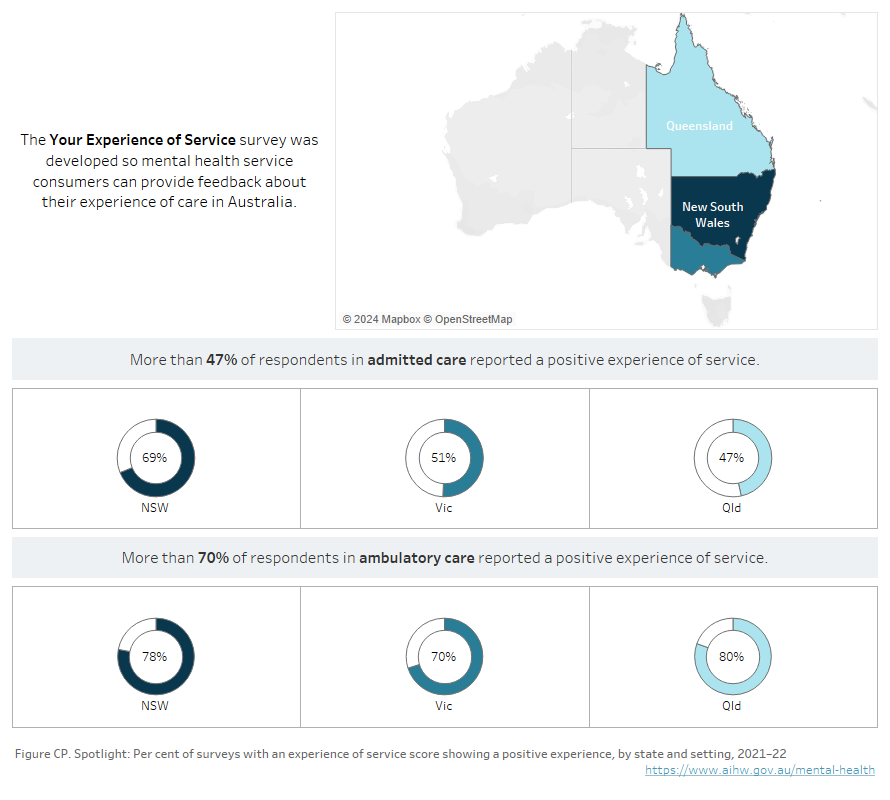
Notes
- An individual consumer may have completed the Your Experience of Service (YES) survey more than once in the reporting period.
- The experience of service score is the average of survey questions 1–22 multiplied by 20. A score of 80 and above (out of 100) indicates a positive experience.
- In NSW, consumers are offered the YES survey throughout the year, while in Vic and Qld, consumers are offered the YES over a particular time of year. Comparisons between jurisdictions should be made with caution.
Source: Your Experience of Service Survey Database; Table CP.5.
The Your Experience of Service (YES) survey collects information from people receiving public mental health care about their experience of care. New South Wales, Victoria and Queensland are the only jurisdictions that currently report data.
In the 7 years to 2021–22, a higher proportion of respondents (consumers) have consistently reported a positive experience of service:
- in ambulatory or residential mental health care compared with admitted settings, and/or
- if the person was receiving care under Voluntary status rather than Involuntary mental health legal status.
Since 2015–16 the findings from the YES survey show higher proportions of respondents reporting a positive experience of service than not. However, about 1 in 20 rated their experience of service as Poor in admitted care and ambulatory care. The survey was designed to help Australian mental health services and consumers work together to improve services. The jurisdictions that have implemented the survey advise they have developed local practices to translate the data received from consumers completing YES to drive quality improvement in their services.
Other states and territories have indicated that they are planning to roll out the YES survey in their specialised mental health services in coming years.
There has been an increased focus by states and territories on strengthening and coordinating efforts to collect patient reported measures, including experience (AIHW 2018). The YES survey was developed primarily for use in Australian public services that specialise in providing mental health care. The survey aims to help services and consumers work together to build better services.
Mental health consumers are invited to complete the survey, where they rate their experience of the service they received across 26 questions using a 1-5 response scale. The survey also includes some questions about consumer demographics (such as age, gender and Aboriginal and/or Torres Strait Islander origin).
Currently New South Wales, Victoria and Queensland are the only jurisdictions that report data for the YES survey.
Figure 1 shows the number of surveys collected from consumers in public mental health services.
- 24,567 surveys were collected during 2021–22.
- NSW collected a much higher number of surveys than Victoria and Queensland, largely due to different survey methods. In New South Wales consumers are offered the survey throughout the year. In Victoria and Queensland consumers are encouraged to complete the survey at a particular time in the year.
- More surveys were collected from consumers who received admitted care than ambulatory (non-admitted) and residential care. This reflects the higher number of surveys collected in New South Wales admitted care compared with Victoria and Queensland, where a higher number of surveys were collected in ambulatory (non-admitted) care.
- The COVID-19 pandemic has impacted Australians and Australian mental health services from early 2020 onwards. The number of surveys received across all states remains lower than before the pandemic.
Figure CP.1: Number of Your Experience of Service surveys collected from consumers of Australian public mental health services
Figure CP.1, vertical stacked bar graph showing the number of surveys completed by mental health consumers during 2021–22 for each state, by service setting. In New South Wales the number of surveys completed is highest in admitted care. In Victoria and Queensland the number of surveys completed is highest in ambulatory care. In all states the number of surveys is lowest for residential care. Refer to Table CP.1.
Figure CP.1.1, line graph showing the number of surveys completed by mental health consumers during 2015–16 to 2021–22 for each state. The number of surveys received across all states remains lower than before the COVID-19 pandemic. Refer to Table CP.1.
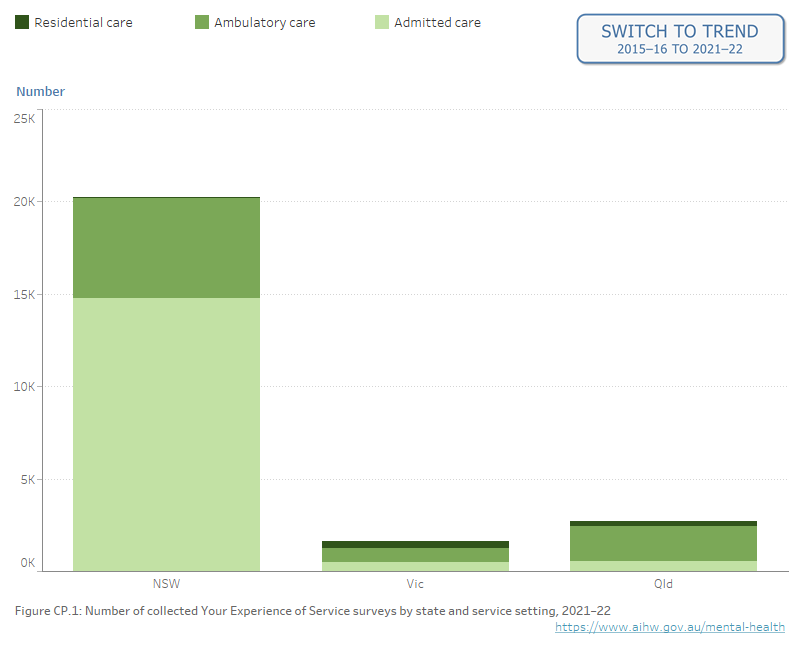
Notes:
1. An individual consumer may have completed the survey more than once in the reporting period.
2. In NSW, consumers are offered the YES survey throughout the year, while in Vic and Qld, consumers are offered the YES over a particular time of year. Comparisons between jurisdictions should be made with caution.
Source: Your Experience of Service Survey Database; Table CP.1.
Service setting
The majority of survey respondents accessed admitted and ambulatory (non–admitted) care settings (15,838 and 8,067 surveys, respectively) with a smaller number in residential care (662). This is consistent with the respective scales of these settings (as reported in the section ‘Specialised mental health care facilities’ of the Mental Health Online Report).
Table CP.2 shows how long YES respondents received care across the different care settings.
In admitted mental health settings, care typically lasts for a period up to a couple of weeks. The average lengths of stay for public mental health hospitalisations are:
- 13 days for mental health-related issues.
- 5 days for non-mental health issues (AIHW 2023a, Table ON.1).
The YES data are in line with this range –just over half (53%) of respondents received admitted care for a period of 1 day to 2 weeks. For more information about mental health-related hospitalisations visit the Admitted patient section.
The length of care received by YES respondents might not be representative of the length of care typically received in residential and ambulatory (non-admitted) settings in general.
In residential care:
- Respondents most often received care for a period of 1 day to 2 weeks (33% of surveys). This is lower than non-survey data on residential mental health care episodes showing 58% of completed residential episodes during 2020–21 were between 0 and 2 weeks (AIHW 2023c, Table RMHC.8).
- Almost a third of respondents received care for more than 6 months (30%). This is higher than non-survey data showing about 1 in 20 of completed residential episodes during 2020–21 were longer than 6 months (AIHW 2023c, Table RMHC.8). For more information about residential mental health care visit the Residential services report.
In ambulatory (non-admitted) care:
- About half of respondents received care for a period of more than 6 months. This is higher than non-survey data on the length of treatment in community mental health care services, which shows 39% of consumers received treatment of longer than 3 months during 2020–21 (AIHW 2023b, Table CMHC.25). For more information about community mental health care visit the Community services report.
Figure 2 shows demographic and other characteristics of YES survey respondents. Higher proportions of surveys were received from people aged between 25 and 54 years and for females.
People who indicated they were not of Aboriginal and/or Torres Strait Islander origin completed the most surveys for admitted and ambulatory (non-admitted) settings, however in residential care 63% of respondents indicated they were Indigenous. This is disproportionate compared with non-survey data which shows about 8% of people accessing residential mental health care were Indigenous (AIHW 2023c, Table RMHC.3).
Figure CP.2: Characteristics of consumers who completed Your Experience of Service surveys
Figure CP.2: Horizontal bar graph showing the per cent of surveys by consumer characteristics (age group, gender, Indigenous status, mental health legal status) and service setting for 2021–22. Refer to Table CP.3.
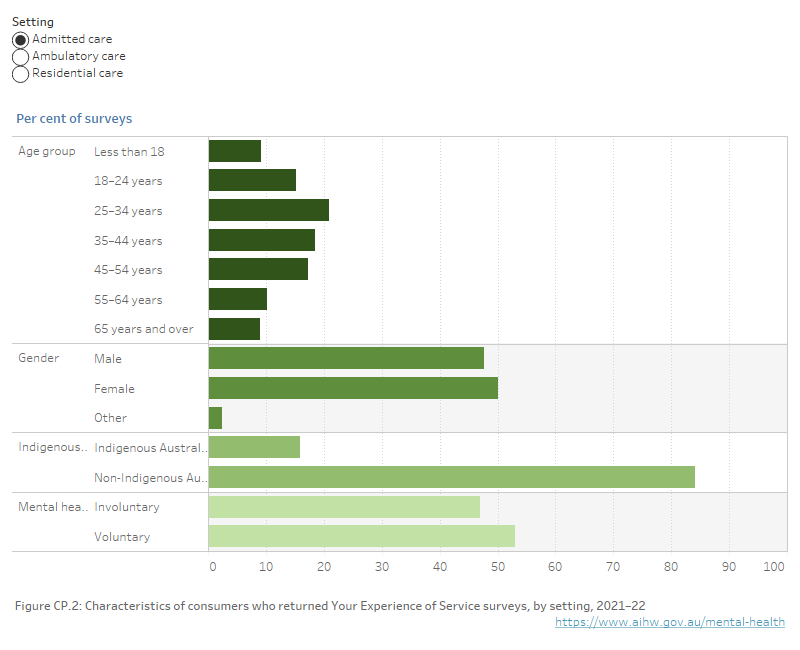
Notes:
1. An individual consumer may have completed the survey more than once in the reporting period.
Source: Your Experience of Service Survey Database; Table CP.3.
Mental health legal status
Mental health legal status refers to whether or not a person received care under the relevant state or territory mental health legislation compulsory treatment provisions. In admitted care, 5,307 (47%) surveys were from respondents with a recorded Involuntary status. There were 1,585 (26%) respondents in ambulatory care and 166 (32%) in residential care who were also recorded to have Involuntary status.
More information about the impact of involuntary treatment on experiences of care is presented below the ‘Who rates a positive experience of service’ heading.
For more information about involuntary treatment in Australian mental health care, visit the Involuntary care report.
How do consumers rate their experience of care?
This refers to data using the consumers’ response to a single question in the YES survey, ‘Overall, how would you rate your experience of care with this service in the last 3 months?’. Consumers can select one of five responses – Poor, Fair, Good, Very Good or Excellent.
The YES survey question, ‘Overall, how would you rate your experience of care with this service in the last 3 months?’ provides an overall indication of a respondent’s experience of care. Figure 3 shows respondents’ ratings of the mental health care they received using this survey item.
Figure CP.3: In non-admitted service settings all states, a higher proportion of consumers rated their experience as 'Excellent' than any other category
Figure CP.3: Vertical bar graph showing the per cent of surveys where consumers rated their experience of service as Poor, Fair, Good, Very Good or Excellent in 2021–22, for each state by service setting. In non-admitted service settings in all states, a higher proportion of consumers rated their experience as ‘Excellent’ than any other category. Refer to Table CP.4.
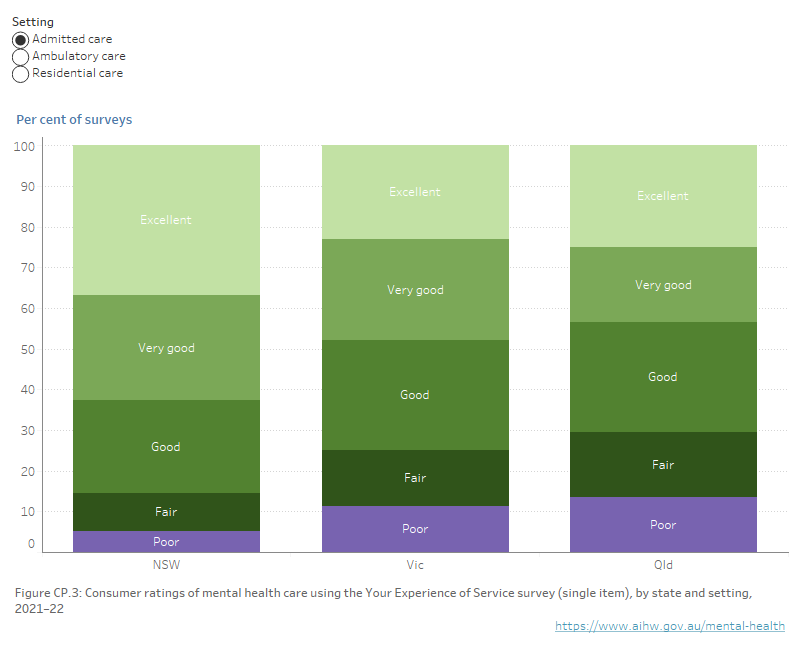
Notes:
1. An individual consumer may have completed the survey more than once in the reporting period.
2. Response to question, 'Overall, how would you rate your experience of care with this service in the last 3 months?'.
Source: Your Experience of Service Survey Database; Table CP.4.
Ratings of care by setting
In admitted care during 2021–22:
- a higher proportion of respondents rated the care they received as ‘Excellent’ (in New South Wales) or as ‘Good’ (in Victoria and Queensland) compared with ratings of ‘Very Good’, ‘Fair’ or ‘Poor’
- 85% of respondents in New South Wales rated the care they received as ‘Good’, ‘Very Good’, or ‘Excellent’, higher than Victoria (75%) and Queensland (70%).
In ambulatory care during 2021–22:
- a higher proportion of respondents rated their care as ‘Excellent’ than other categories in all states
- in Queensland, 91% of respondents rated the care they received as ‘Good’, ‘Very Good’, or ‘Excellent’; 87% of respondents in New South Wales and 87% of respondents in Victoria also gave these ratings. These proportions are higher than those observed for admitted care.
In residential care during 2021–22:
- a higher proportion of respondents rated their care as ‘Excellent’ than other categories
- in Queensland, 93% of respondents rated the care they received as ‘Good’, ‘Very Good’, or ‘Excellent’ and 95% of respondents gave these ratings in Victoria. These proportions are higher than those observed for admitted care.
Who rates a positive experience of service?
This positive experience of service score is calculated using a method developed to reflect each respondent’s experience across multiple survey questions. It is calculated using all 22 survey questions to generate a score. A threshold score is used to indicate a positive experience of service.
Figure 4 shows the proportions of respondents indicating a positive experience of an Australian mental health service.
Figure CP.4: In all states, higher proportions of consumers indicated a positive experience of a mental health service than not in ambulatory (non-admitted) and residential settings.
Figure CP.4, Interactive bar graph showing the per cent of consumer surveys with an experience of service score of 80 and above indicating a positive experience, by state and setting, in 2015–16 to 2021–22. Refer to Table CP.5.
Figure CP.4.1, Interactive horizontal bar graph showing the per cent of consumer surveys with an experience of service score of 80 and above, indicating a positive experience of service, by setting and state, and age group, gender, Indigenous status and mental health legal status in 2021–22. Refer to Tables CP.6 and 7.
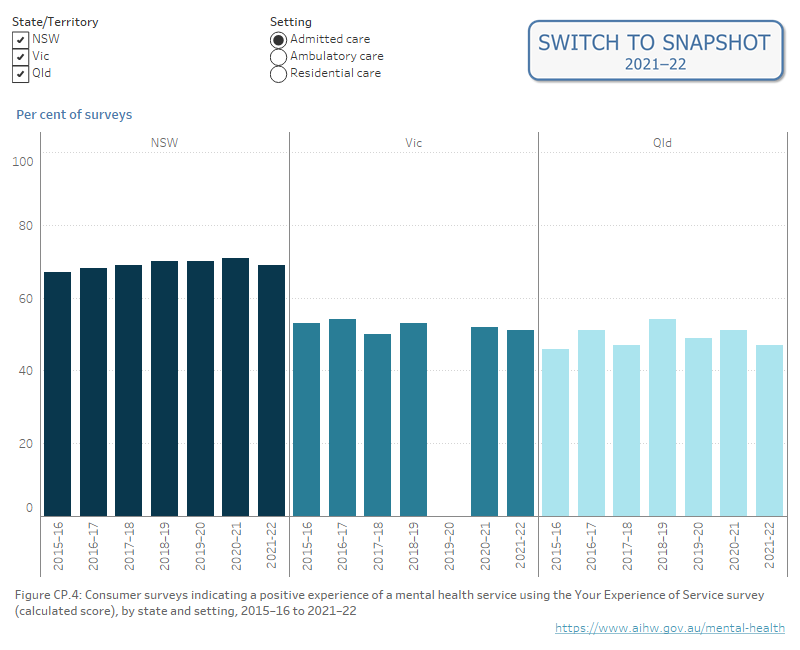
Notes:
-
An experience of service score of 80 and above (out of 100) indicates a positive experience.
-
The experience of service score is the average of survey questions 1-22 multiplied by 20.
-
An individual consumer may have completed the survey more than once in the reporting period.
Source: Your Experience of Service Survey Database; Figure CP.4 - Table CP.5, Figure CP.4.1 - Tables CP.6 and 7.
During 2021–22, a higher proportion of respondents indicated a positive experience of care than not, in all service settings and jurisdictions, except in admitted care in Queensland (Figure CP.4).
In all 3 jurisdictions, ambulatory care and residential care had a higher proportion of respondents who rated their experience positively than admitted care.
- In admitted care, 69% of respondents in New South Wales reported a positive experience of service, 51% in Victoria and 47% in Queensland.
- In ambulatory care, New South Wales had 78% of respondents with a positive experience of service, Victoria had 70% and Queensland 80%.
- In residential care, 80% of Victorian respondents and 77% of Queensland respondents had a positive experience of service.
Positive experience of service by respondent demographics
When comparing age groups, respondents aged 65 years and older usually reported the highest proportions of people with a positive experience of service. This was observed for admitted care for New South Wales and Victoria and for ambulatory care for New South Wales and Queensland.
Proportions of respondents with a positive experience of service were more than 10 percentage points lower for consumers who identified as Other gender compared with Males and Females. This was observed for admitted care for all states and for ambulatory care for New South Wales and Victoria. (Figure CP.4.1).
The relatively small number of respondents who identified as Other gender should be taken into consideration when comparing these results.
Positive experience of service by Indigenous status
The proportions of Indigenous respondents who had a positive experience of service were lower than for non-Indigenous respondents for all settings and states except admitted care in New South Wales, where the proportions were the same.
Positive experience of service by mental health legal status
During 2021–22, the proportions of respondents who returned a positive experience of service score were higher with Voluntary mental health legal status than Involuntary status for all service settings and states. Percentages varied by setting and state. More than a quarter of surveys (27%) were from respondents who marked their mental health legal status as ‘Not reported’.
Where do I find more information?
Involuntary treatment in mental health care
Many people improve clinically after care from public mental health services. Improvement is seen after about 72% of hospital care episodes and 51% of community care episodes according to clinician-rated measures (Gee et al. 2022). More information is in the Consumer outcomes report.
If the information presented raises any issues for you, these resources can help:
Notes to interpret the data
Monitoring mental health consumer and carer experiences of service has been a long-term goal of the National Mental Health Strategy (for example, the Australian Government Department of Health and Aged Care’s (the department) National Mental Health Policy 2008). In 2010, under the Fourth National Mental Health Plan (Commonwealth of Australia 2009), the department funded the National Consumer Experiences of Care project to develop a survey for use in public mental health services (Victorian DHHS 2013). This project resulted in the development of the YES survey, which was finalised in 2014. The survey instrument was developed by the Victorian Department of Health and Human Services under the auspices of the former Mental Health Information Strategy Standing Committee (MHISSC). Implementation of the survey and national reporting of the data has been a key action under the Fifth National Mental Health and Suicide Prevention Plan (CHC 2017).
A measure of carer experiences has also been developed. The Mental Health Carer Experience Survey (MHCES) aims to measure the experiences of carers, such as family members, partners or friends of people who access mental health services. New South Wales implemented the survey in 2018 and Queensland implemented the survey in 2019 (NSW Ministry of Health 2019; Queensland Health 2020). Victoria implemented this survey in 2021.
The YES survey instrument is made available by the Department of Health and Aged Care for use by appropriate mental health organisations that enter a licensing agreement specifying conditions of use which are aimed at promoting consistency of use and reducing the risk of multiple versions being used.
For further information on use of the YES survey and/or to apply for a licence to use the survey in your organisation, please visit the Australian Mental Health Outcomes and Classification Network website.
The YES survey comprises 26 questions about a mental health consumer’s perceptions of their treatment and the care they received. Respondents answer each question using the following response scales:
- For questions 1–17, respondents indicate how often the service did a range of things during their care (1– Never, 2 – Rarely, 3 – Sometimes, 4 – Usually, 5 – Always). Examples include: ‘You felt welcome at this service’, ‘Staff showed hopefulness for your future’, and ‘Your opinions about the involvement of family or friends in your care were respected’.
- For questions 18–26, respondents indicate how well the service performed during their care (1 – Poor, 2 – Fair, 3 – Good, 4 – Very Good, 5 – Excellent). Examples include: ‘Explanation of your rights and responsibilities’, ‘Access to peer support’, and ‘The effect the service had on your overall well-being’.
The YES survey was developed primarily for use in public specialised mental health services. Currently three jurisdictions have implemented the survey and provide data for annual national reporting.
- In New South Wales consumers are offered the survey throughout the year.
- In Victoria and Queensland consumers are encouraged to complete the survey at a particular time in the year.
This difference in methodology should be considered when interpreting data from different states. More information is in the Data Quality Statement .
New South Wales has publicly reported their survey data since 2015–16 (NSW Ministry of Health, 2017a, 2017b, 2018, 2019, 2021a, 2021b, 2022).
Victoria has publicly reported their survey data in their Annual Mental Health Services Report from 2016–17 to 2018–19, including information on their early 2016 survey for 2015–16 (Victorian DHHS 2017, 2018, 2019).
Queensland has publicly reported survey data for the collection periods in 2015 to 2017 and 2019 (Queensland Health 2016, 2017a, 2017b, 2020).
The former Mental Health Information Strategy Standing Committee (MHISSC) developed a nationally agreed scoring methodology to reflect each respondent’s experience of service across 22 questions in the YES survey.
The experience of service score for each respondent is equal to the average response of questions 1–22 multiplied by 20. The resulting overall score converts the individual question responses into a score out of 100.
The proportion of respondents with an experience of service score over 80 on the YES measure was agreed by the former MHISSC as the metric (indicator) to be used for monitoring consumer experience of service under the Fifth National Mental Health and Suicide Prevention Plan (CHC 2017).
The treatment of missing data in calculating the experience of service score differs between NSW and the AIHW. Therefore the numbers reported by NSW Health and the AIHW’s Mental Health Online Report may differ.
Data in this report are supplied under the YES National Best Endeavours Data Set (YES NBEDS) agreement. The YES NBEDS was developed to collect and monitor consumers’ experiences of service over time. Participating jurisdictions agree to provide data to the YES NBEDS through their state/territory representative.
Data Quality Statements are published for the YES data collection on the Metadata online repository, METEOR. Statements provide information on the institutional environment, timeliness, accessibility, interpretability, relevance, accuracy and coherence. Refer to the Your Experience of Service NBEDS 2019-: Your Experience of Service Database, 2022; Quality Statement.
AIHW (Australian Institute of Health and Welfare) (2023a) Admitted patients mental health-related care 2020–21, Mental Health Online Report, accessed 8 May 2023.
AIHW (2023b) Community mental health care services 2020–21, Mental Health Online Report, accessed 9 May 2023.
AIHW (2023c) Residential mental health care services 2020–21, Mental Health Online Report, accessed 9 May 2023.
CHC (COAG [Council of Australian Governments] Health Council) (2017) The Fifth National Mental Health and Suicide Prevention Plan, Department of Health, Australian Government.
Commonwealth of Australia (2009) Fourth National Mental Health Plan—An agenda for collaborative government action in mental health 2009–2014, Attorney-General’s Department, Australian Government.
Gee A, Harris M, Burgess P, and Thomson J (2022) Use of a clinical outcomes national
data collection in measuring performance of mental health services, 12th Health Services Research Conference, 30 Nov–2 Dec 2022, Sydney Australia.
NSW Ministry of Health (2017a) Your Experience of Service: What consumers say about NSW Mental Health Services, 2015–2016, accessed 26 July 2018.
NSW Ministry of Health (2017b) Your Experience of Service: What consumers say about NSW Mental Health Services, 2016–2017, accessed 26 July 2018.
NSW Ministry of Health (2018) Your Experience of Service: What consumers say about NSW Mental Health Services, 2017–18, accessed 9 July 2019.
NSW Ministry of Health (2019) Your Experience of Service: What consumers say about NSW Mental Health Services, 2018–19, accessed 31 July 2020.
NSW Ministry of Health (2021a) Your Experience of Service: What consumers say about NSW Mental Health Services, 2019–20, accessed 12 July 2021.
NSW Ministry of Health (2021b) Your Experience of Service: What consumers say about NSW Mental Health Services, 2020–21, accessed 10 June 2022.
NSW Ministry of Health (2022) Your Experience of Service: What consumers say about NSW Mental Health Services, 2021–22, accessed 11 May 2023.
Queensland Health (2016) Your Experience of Service—-2015 Statewide Report.
Queensland Health (2017a) Your Experience of Service—-2016 Statewide Report.
Queensland Health (2017b) Your Experience of Service—2017 Statewide Report, accessed 9 July 2019.
Queensland Health (2020) Your Experience of Service—2019 Statewide Report, accessed 11 July 2023.
Victorian DHHS (Department of Health and Human Services) (2013) National Mental Health Consumer Experiences of Care Project, Australian Commission on Safety and Quality in Health Care, accessed 8 July 2019.
Victorian DHHS (2017) Victoria’s mental health services annual report 2016–17, accessed 26 July 2018.
Victorian DHHS (2018) Victoria’s mental health services annual report 2017–18, accessed 5 July 2019.
Victorian DHHS (2019) Victoria’s mental health services annual report 2018–19, accessed 31 July 2020.
Data coverage is 2015–16 to 2021–22 for New South Wales, Queensland and Victoria. It is anticipated that data will become available from additional jurisdictions for future updates. This section was last updated in July 2023.


